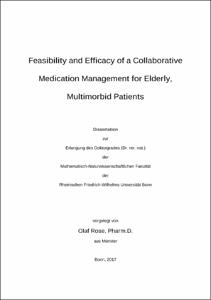Feasibility and Efficacy of a Collaborative Medication Management for Elderly, Multimorbid Patients

Feasibility and Efficacy of a Collaborative Medication Management for Elderly, Multimorbid Patients

| dc.contributor.advisor | Jaehde, Ulrich | |
| dc.contributor.author | Rose, Olaf | |
| dc.date.accessioned | 2020-04-23T23:39:00Z | |
| dc.date.available | 2020-04-23T23:39:00Z | |
| dc.date.issued | 29.08.2017 | |
| dc.identifier.uri | https://hdl.handle.net/20.500.11811/7203 | |
| dc.description.abstract | Medication Review and Medication Management are new pharmaceutical care services with a strong potential to contribute to patients’ health care outcomes. The aim of this work was to evaluate an interprofessional, collaborative Medication Management in an outpatient setting in Germany. Objectives were to assess the efficacy of the intervention, to identify risk groups, who might carry a higher benefit from a Medication Management, to assess the results of the Medication Reconciliation process and to examine the acceptance of the collaborative Medication Management. 165 elderly multimorbid patients from 12 primary care practices were included in this cluster-randomized controlled study, following a stepped wedge design. A comprehensive Medication Review was performed twice and interprofessional action was undertaken, leading to prospective data on 142 patients and covering a 15 months’ span of life. With a greater reduction in the MAI score of 4.27 points (p < 0.001) in the intervention group, the efficacy of a Medication Management in improving the quality of drug therapy was demonstrated. DRPs were reduced significantly, supporting this result. The efficacy in terms of the reduction of LDL-cholesterol concentrations showed significance in the before-after analysis (p = 0.012). However, in a Mixed Model the effect of the intervention was not significant. The results further suggest the number of drugs in use (p=0.001) and the number of discrepancies between prescribed and used drugs (p=0.014) as patient selection criteria for a Medication Management. The baseline MAI score (p<0.001) and the length of the intervention (p=0.006) correlated with positive outcomes as well but are not feasible for patient selection. Medication Reconciliation revealed that the majority of drugs, which were not documented by the prescriber, were prescription drugs with clinically significant effects and risks. Therefore, an individual medication plan is highly desired to increase patient safety. The interprofessional acceptance of the study with 54.9% of the recommendations being implemented, shows an effective collaboration between physicians and pharmacists within the Medication Management process. The demonstrated efficacy and a high interprofessional acceptance support the implementation of a Medication Management into German health care. | en |
| dc.language.iso | eng | |
| dc.rights | In Copyright | |
| dc.rights.uri | http://rightsstatements.org/vocab/InC/1.0/ | |
| dc.subject | Medication Management | |
| dc.subject | Medication Review | |
| dc.subject | collaborative | |
| dc.subject | interprofessional | |
| dc.subject | pharmaceutical care | |
| dc.subject.ddc | 540 Chemie | |
| dc.subject.ddc | 615 Pharmakologie, Therapeutik | |
| dc.title | Feasibility and Efficacy of a Collaborative Medication Management for Elderly, Multimorbid Patients | |
| dc.type | Dissertation oder Habilitation | |
| dc.publisher.name | Universitäts- und Landesbibliothek Bonn | |
| dc.publisher.location | Bonn | |
| dc.rights.accessRights | openAccess | |
| dc.identifier.urn | https://nbn-resolving.org/urn:nbn:de:hbz:5n-47694 | |
| ulbbn.pubtype | Erstveröffentlichung | |
| ulbbnediss.affiliation.name | Rheinische Friedrich-Wilhelms-Universität Bonn | |
| ulbbnediss.affiliation.location | Bonn | |
| ulbbnediss.thesis.level | Dissertation | |
| ulbbnediss.dissID | 4769 | |
| ulbbnediss.date.accepted | 01.06.2017 | |
| ulbbnediss.institute | Mathematisch-Naturwissenschaftliche Fakultät : Fachgruppe Pharmazie / Pharmazeutisches Institut | |
| ulbbnediss.fakultaet | Mathematisch-Naturwissenschaftliche Fakultät | |
| dc.contributor.coReferee | Läer, Stephanie |
Dateien zu dieser Ressource
Das Dokument erscheint in:
-
E-Dissertationen (4495)




